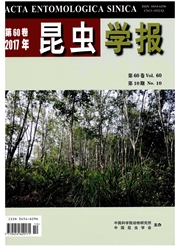

 中文摘要:
中文摘要:
蝇蛆抗菌肽多有广谱抗菌、抗癌等功能,是很好的天然抗菌药物来源,但由于得率较低,目前对其产品开发的研究较少。以家蝇Musca domestica干蝇蛆为原料,利用加热.层析法和海藻酸吸附法2种工艺提取蝇蛆抗菌肽。结果表明:加热.层析法快速、简便,抗菌肽提取得率达0.26%,是海藻酸吸附法提取抗菌肽得率的5.2倍。提取的家蝇抗菌肽主要是分子量6.2—17.2kD、等电点5.59—5.91的弱酸性小分子多肽,其热稳定性高,能杀灭枯草杆菌Bacillus subtilis等多种革兰氏阳性菌。加热.层析法能有效去除外源性蛋白酶,保证肽类产品的稳定性,同时还能提取出非蛋白类的抗菌成分,提示其对开发具有高附加值的抗菌产品将会有良好的应用前景。
 英文摘要:
英文摘要:
It is not good enough to produce antibacterial peptides by genetic engineering because of much technology troubles involved and the mono-kind of peptide with narrow antimicrobial spectrum. It is very significant and valuable to isolate antibacterial peptides from abundant crude resource. Antibacterial peptides extracted from Musca larvae, which have multi-functions such as antibacterial and antitumor activities, are good natural medicine resources, but the product development research is few for the lower extracting ratio. Using natural material of dried Musca domestica larvae, by comparing the activities and characteristics of antibacterial peptides extracted by two methods such as heat-chromatography and alginic-acid-absorption, it had been proved that heat-chromatography was a quick, simple method with 0.26% peptides extracting ratio which was 5.2-fold to that of alginic-acid-absorption. The major antibacterial peptides extracted by heat- chromatography were determined having Mw 6.2 - 17.2 kD with Tricine-SDS-PAGE and pI 5.59 - 5.91 with IEF-PAGE. The peptides were very thermo-stable and had antibacterial activity against Gram-positive bacteria such as Bacillus subtilis. Besides maintaining the stability of bioactive peptides by removing the exotic proteases, the heat-chromatography could also extract non-peptides with antibacterial activity. This technique may be used to exploit the resource of houseflies sufficiently and develop the antibacterial products with high additional value supplying to medical treatment and health protection.
 同期刊论文项目
同期刊论文项目
 同项目期刊论文
同项目期刊论文
 期刊信息
期刊信息
